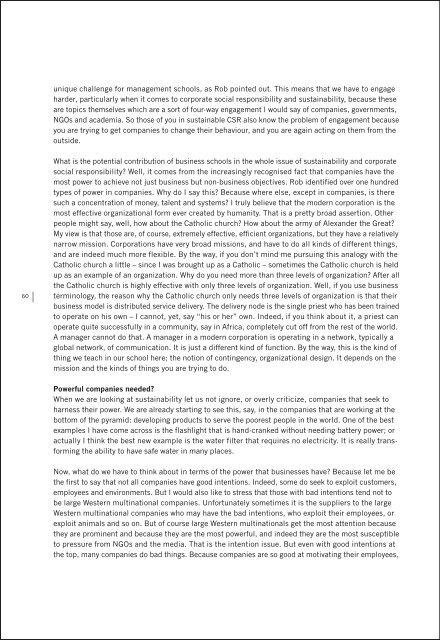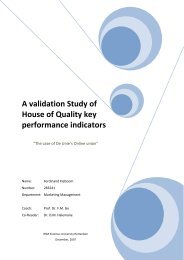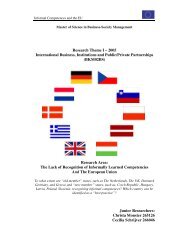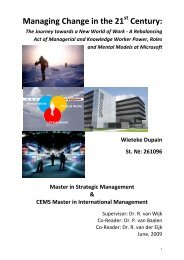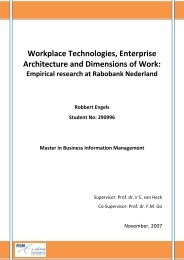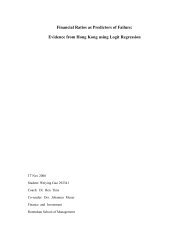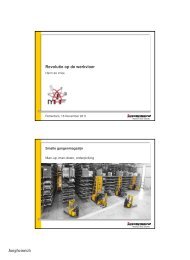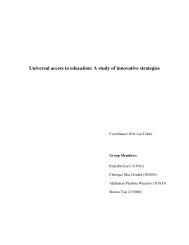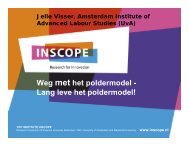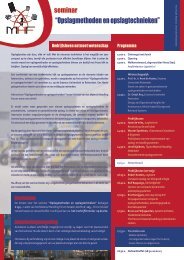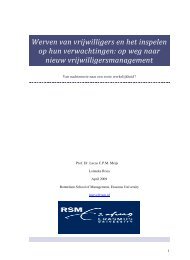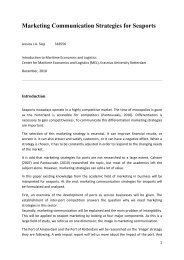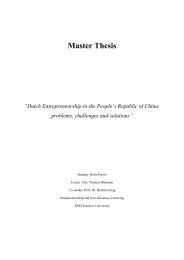Download With great power comes great responsibility (pdf) - ERIM
Download With great power comes great responsibility (pdf) - ERIM
Download With great power comes great responsibility (pdf) - ERIM
Create successful ePaper yourself
Turn your PDF publications into a flip-book with our unique Google optimized e-Paper software.
60<br />
unique challenge for management schools, as Rob pointed out. This means that we have to engage<br />
harder, particularly when it <strong>comes</strong> to corporate social <strong>responsibility</strong> and sustainability, because these<br />
are topics themselves which are a sort of four-way engagement I would say of companies, governments,<br />
NGOs and academia. So those of you in sustainable CSR also know the problem of engagement because<br />
you are trying to get companies to change their behaviour, and you are again acting on them from the<br />
outside.<br />
What is the potential contribution of business schools in the whole issue of sustainability and corporate<br />
social <strong>responsibility</strong>? Well, it <strong>comes</strong> from the increasingly recognised fact that companies have the<br />
most <strong>power</strong> to achieve not just business but non-business objectives. Rob identified over one hundred<br />
types of <strong>power</strong> in companies. Why do I say this? Because where else, except in companies, is there<br />
such a concentration of money, talent and systems? I truly believe that the modern corporation is the<br />
most effective organizational form ever created by humanity. That is a pretty broad assertion. Other<br />
people might say, well, how about the Catholic church? How about the army of Alexander the Great?<br />
My view is that those are, of course, extremely effective, efficient organizations, but they have a relatively<br />
narrow mission. Corporations have very broad missions, and have to do all kinds of different things,<br />
and are indeed much more flexible. By the way, if you don’t mind me pursuing this analogy with the<br />
Catholic church a little – since I was brought up as a Catholic – sometimes the Catholic church is held<br />
up as an example of an organization. Why do you need more than three levels of organization? After all<br />
the Catholic church is highly effective with only three levels of organization. Well, if you use business<br />
terminology, the reason why the Catholic church only needs three levels of organization is that their<br />
business model is distributed service delivery. The delivery node is the single priest who has been trained<br />
to operate on his own – I cannot, yet, say “his or her” own. Indeed, if you think about it, a priest can<br />
operate quite successfully in a community, say in Africa, completely cut off from the rest of the world.<br />
A manager cannot do that. A manager in a modern corporation is operating in a network, typically a<br />
global network, of communication. It is just a different kind of function. By the way, this is the kind of<br />
thing we teach in our school here; the notion of contingency, organizational design. It depends on the<br />
mission and the kinds of things you are trying to do.<br />
Powerful companies needed?<br />
When we are looking at sustainability let us not ignore, or overly criticize, companies that seek to<br />
harness their <strong>power</strong>. We are already starting to see this, say, in the companies that are working at the<br />
bottom of the pyramid: developing products to serve the poorest people in the world. One of the best<br />
examples I have come across is the flashlight that is hand-cranked without needing battery <strong>power</strong>; or<br />
actually I think the best new example is the water filter that requires no electricity. It is really trans -<br />
forming the ability to have safe water in many places.<br />
Now, what do we have to think about in terms of the <strong>power</strong> that businesses have? Because let me be<br />
the first to say that not all companies have good intentions. Indeed, some do seek to exploit customers,<br />
employees and environments. But I would also like to stress that those with bad intentions tend not to<br />
be large Western multinational companies. Unfortunately sometimes it is the suppliers to the large<br />
Western multinational companies who may have the bad intentions, who exploit their employees, or<br />
exploit animals and so on. But of course large Western multinationals get the most attention because<br />
they are prominent and because they are the most <strong>power</strong>ful, and indeed they are the most susceptible<br />
to pressure from NGOs and the media. That is the intention issue. But even with good intentions at<br />
the top, many companies do bad things. Because companies are so good at motivating their employees,<br />
they can also motivate them to do the wrong things; to skimp on safety so that you end up with an oil<br />
spill. Now, of course, BP did not say to the employees “we want you to skimp on safety”, what they<br />
might have said was that they wanted them to maximise profits in the period in question, and not spend<br />
too much on maintenance, etc.<br />
Lending money for mortgages where there is little chance of repayment – why did that happen? Of<br />
course the people at the top of the company did not say “we want you to lend mortgages which nobody<br />
can repay”, but they made the mistake of putting in incentive systems that rewarded the bank managers<br />
for the volume of loans they originated, and not for the end result five or ten years down the road.<br />
Companies do need to be regulated and they do need to be under pressure from NGOs, but the issue<br />
is to achieve the right balance. For NGOs in particular this means engaging with companies and not<br />
demonising them. There is, of course, a temptation for NGOs to exercise their <strong>power</strong>, which is often<br />
the <strong>power</strong> of the protest and the <strong>power</strong> of media and also launching social media campaigns. Just last<br />
week I was reading about an American company that Greenpeace launched a campaign against, on<br />
the basis that this company’s suppliers were exploiting pigs that gave the leather that went into some<br />
of their clothes, rather than actually looking at the processes the company already had in place for the<br />
safe and ethical treatment of the animals. Engage with them and do not just overuse your own <strong>power</strong>.<br />
Then there is the very interesting research issue of whether stakeholders such as NGOs should have<br />
a role in corporate governance. Here it is interesting to contrast the Anglo-American system and the<br />
continental European system. One of the difficulties in the Anglo-American system, where the share -<br />
holder is supposed to be paramount, is actually the issue of fiduciary duty. If you put an NGO on the<br />
board in an Anglo-American style system they may have a fiduciary duty to maximise the interests of<br />
the shareholders, and could even be sued if they are doing things that are not directly promoting the<br />
interests of shareholders. Perhaps it is better for an NGO to be on an advisory board instead, but this<br />
is a very interesting and fruitful area of research that Rob and his colleagues are looking at. The jury is<br />
definitely out on this issue.<br />
Knowledge without <strong>power</strong>?<br />
Another question that Rob van Tulder raised in his paper, rather cheekily I thought, was whether business<br />
schools themselves can be organized without <strong>power</strong>, and if not, how <strong>power</strong> can be distributed evenly<br />
and productively. I am a bit biased, as a Dean, because my view is that without formal <strong>power</strong> academia<br />
will be taken over by the tyranny of demagogues, the Robespierres of academia – for the youngsters<br />
among you, perhaps, Robespierre was the French revolutionary who started the terror, and believe me<br />
some professors are incipient Robespierres. I do believe in a system of countervailing <strong>power</strong>. When I<br />
arrived at RSM I found that we have very <strong>power</strong>ful department Chairs, almost in the German model,<br />
really controlling the departments. I use the Dean’s office to offset that and to make life fairer for<br />
individual faculty members, so I have actually dealt with this <strong>power</strong> issue myself. Then another question<br />
Rob raised for me was – can a publish or perish organization of science contribute to the production of<br />
societally relevant knowledge? Again, this is a particularly difficult issue for management science, but<br />
the peer review process means that we do run the danger of losing touch with our subjects of study:<br />
companies and society. Again, the solution is more engagement and support from companies and<br />
NGOs, with strings attached. <strong>With</strong> strings attached? Yes, this is heresy for a Dean to say this, but I<br />
want financial supporters from business and NGOs to attach strings to the research centres that they<br />
sponsor, because strings that tie us back to the subjects of interest to the sponsors keep us more<br />
relevant, and that is the model I have adopted at RSM for those who have been generous enough to<br />
sponsor our research.<br />
61


